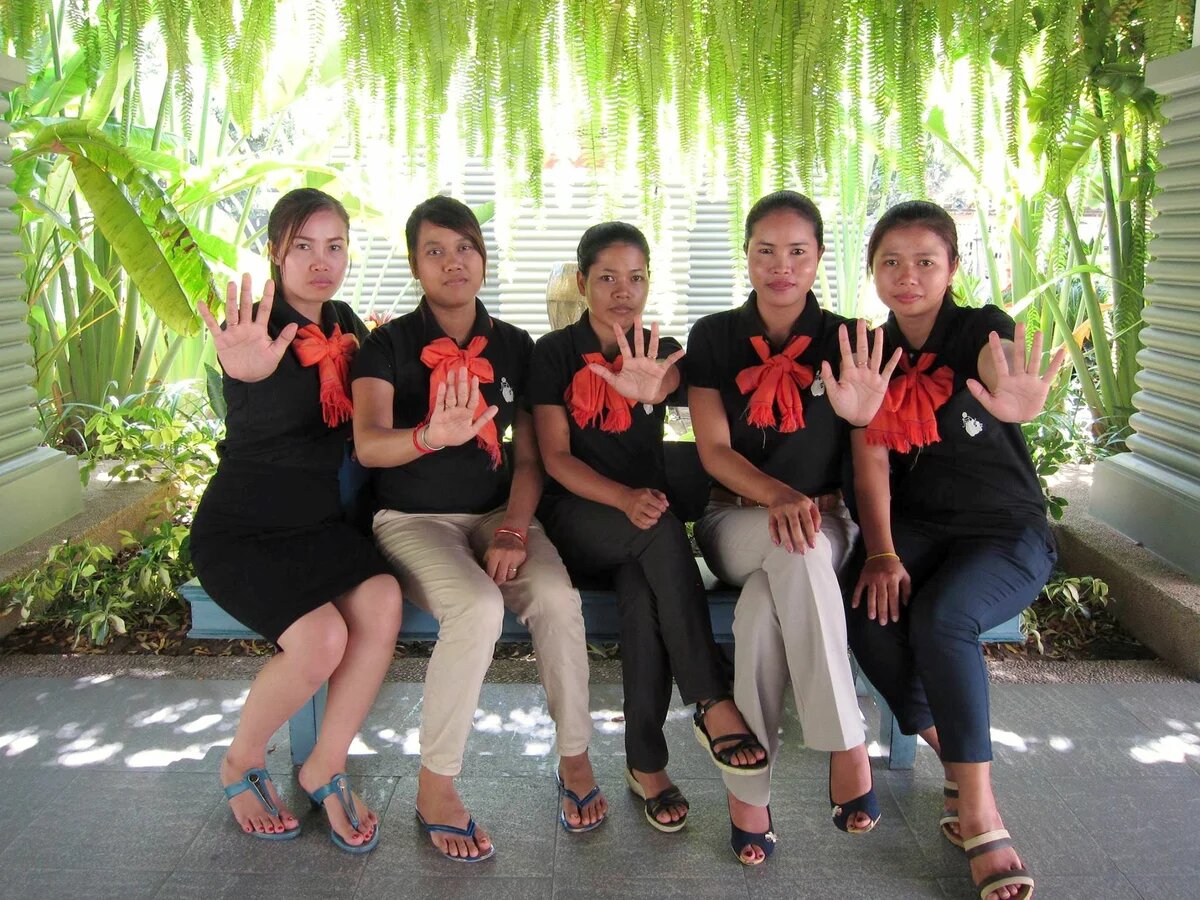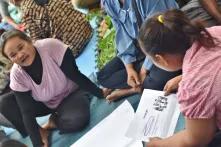CSOs in Cambodia have had to maneuver in an increasingly repressive environment, but the challenges and failures that they have had to face thus far have led to important reflections and learnings.

The Paris Peace Agreements of 1991, which formally marked the end of the decade-long civil war, were a turning point for Cambodia: The country’s new constitution allowed the formation of a liberal democratic government and the establishment of civil society organisations (CSOs). Since then, numerous CSOs and NGOs have taken up work in areas like development, education, human rights, and gender equality. The first democratic election, supported by the UN, took place in 1993.
CSOs in the form of NGOs, Community Based Organisations, networks, and civic alliances have been backed by the constitution and the many international human rights treaties that Cambodia has signed.
In late 2017, Cambodia’s main opposition party, the Cambodia National Rescue Party (CNRP) was dissolved by the Supreme Court due to accusations that it was plotting to take power with the help of the United States and challenge the leadership of prime minister Hun Sen, who has held this position for the past 35 years. Since then, the government has cracked down on independent media, arrested trade union leaders, environmental activists, and silenced any oppositional voices, posing a harsh threat to civil society spaces and oppositional voices in the country.
Despite these challenges and the fear that it has spread among civil society in general, CSOs have continued their work in many areas. This gives reasons to hope that CSOs are able to devise various creative ways, raise their voices and continue to have an impact across the country.
The work of CSOs in Cambodia
Since 1993, CSOs of different kinds have been established and grown in all parts of the country through an influx of grants and foreign aid over the past twenty years. CSOs support victims of domestic violence, farmers who lost their land, environmentalists, and other marginalised groups and help them articulate their positions to enter a dialogue with government agencies at both national and regional levels.
CSOs that work at the nexus of local and international levels function like windows into the global world. Through them, Cambodians have the chance to bring the country’s concerns to international forums and to project international agendas back into the country. One such example is the work on gender and women’s issues, where Cambodian CSOs are engaged at the local and national administrative levels to ensure that the concerns of women and LGBTIQ* groups and individuals are addressed, which thereby contributes to the global agenda for gender equality.
The cooperation between CSOs and the government has contributed to a better understanding of pressing social issues among government officials, while also promoting meaningful engagement towards adopting legal and judicial reforms, strengthening governance structures, enabling transparency, responsiveness, and accountability mechanisms, and promoting general improvements in the quality of people’s lives. For example, CSOs working in the labour sector have continuously fought for minimum wages and overall improved working conditions for Cambodian workers. While more work is required to achieve real positive change for marginalised groups, the engagement thus far has proved that CSOs play an important role in reminding the government of their obligation to respect, protect and fulfill the rights of these groups and that CSOs are not opponents but partners in this endeavour.
CSOs are also acknowledged as stakeholders in various business and government platforms, and play a particularly active role in the cooperation between the government and international donor agencies. Moreover, the areas in which CSOs are active generally receive more attention and have reached a larger public discourse. Through their work and engagement, citizens have become sensitised about their rights to public services and how to access them. Technology and social media have made it a lot easier to reach people since many citizens around the country now have access to the internet.
Civil, political, social, cultural, and economic rights are fundamental and have gained more awareness among the public and citizens have found new ways to draw attention to their issues. However, the government has failed to adapt to the new developments and to understand the needs of the population; their resistance to reform and to adapt to the use of digital technologies is not only hampering development but also keeps information and public services from people in need.
The work that CSOs do in political and civic education goes beyond just informing people about their right and duty to vote in parliamentary elections. The educational programmes follow a broader approach to educate people about the political system at large and the meaning of universal civil and political rights.
CSOs help women who have become victims of abuse, discrimination, and exploitation, by protecting their human rights and representing a support network for them. Through CSOs, victims can access psychological, medical, financial, and legal support. They step in where the government is absent, and prototype models for shelters and other social institutions that government agencies later choose to adapt. Some organisations provide expertise in legal support while others provide psychological services at various geographical locations across the country.
These efforts have not gone unnoticed. Numerous government programmes that are supported by international donors have included CSOs as their implementing partners because their work at grassroots levels is indispensable. At the same time, CSOs are working independently from government funding, and have established employment at the local level. Despite putting increasing pressure on CSOs and trying to curb their critical voices, the government benefits greatly from the contribution made by the CSO in many sectors, from development and education to legal and judicial reforms.
The Achievements of CSOs
Cambodia has ratified eight of the nine international human rights treaties and signed the Convention on Protection of Migrant Workers and their Families. CSOs have used these commitments to human rights treaties to hold the government accountable to protect, respect, and fulfill them.
Cambodia is also a signatory on the International Covenant of Social, Economic and Cultural Rights (ICSECR), a UN human rights treaty that commits its parties to work toward granting economic, social, and cultural rights to individuals, including labour rights, the right to health, the right to education and the right to adequate standards of living. When civil society saw their work increasingly under attack by the government and a sense of fear spread among CSOs, knowing about their rights gave them the confidence to continue their work. CSOs often come together on issues (against repression, discrimination, corruption, etc.) and collectively issue statements against repressive or unjust measures by local authorities or government agencies.
One such example of collective action took place on the 135th International Labour Day when 24 CSOs jointly requested the government to step up on the protection of rights of workers and their livelihoods.
103 CSOs also issued a joint statement to the government in an appeal to get microfinance institutions (MFIs) and banks to suspend all loan payment and interest accrual for at least three months so that borrowers could stay home and stay safe during COVID-19 outbreak without needing to fear losing their land or home if they are unable to pay back their debt during this time.
Another 24 CSOs collectively demanded from the government to increase efforts to prevent gender-based violence and all other forms of violence against women, children, and LGBT+ individuals who are in quarantine and in areas affected by the lockdown due to COVID-19.
Moreover, CSOs in Cambodia also came together to protect a female police officer who faced disciplinary action for posting a picture of herself on Facebook where she could be seen nursing her baby in her uniform. 39 CSOs issued a joint statement to improve women’s rights in the workplace and requested the government to take appropriate measures to ensure that all working parents receive support and that child care facilities are made available to them.
In addition to calling for respect and protection for the rights of workers, activists, and victims of violence, 86 CSOs (including organisations and individuals) formulated an open letter to relevant ministries requesting legal action against three high profile individuals on cases of domestic violence, sexual harassment and sexual violence against women.
CSOs and shrinking spaces
Civil society has in recent years been subject to increasing harassment from the government and is operating in a repressive environment that is unprecedented in Cambodia’s history. The fear among CSO stakeholders has been fueled by arrests of a growing number of activists, human rights defenders, and trade union leaders. Self-censorship and slowing down of CSO activities in certain areas would be an expected consequence of the increasingly hostile context, however, civil society can build on a network that is too strong to succumb to the threats.
The work of CSOs in the last three decades cannot be undone. The increasing shrinking spaces, intended to work as shackles on activists, journalists, and so on, illustrate a pointless fear of critical voices, as it fails to acknowledge the positive impact of civil society interventions on the development of the country. This puts an additional burden on important reforms.
CSOs have been accused of acting as allies of the political opposition parties. This is a serious misrepresentation of the groundwork that has been done.
The allegation is a grave misrepresentation of the role of civil society. that CSOs are backed by political opposition parties is simply based on the perceived oppositional nature of both. Opposition parties naturally run their political agendas against the ruling party. On the other hand, CSOs work to educate and raise awareness among citizens about their rights so that they can hold the government accountable, (which is the core of a functioning democracy). Instead of silencing their voices, the government should embrace and work with civil society because they are an important mirror into the society and highlight problems where the state does not reach. A collaboration would not only benefit the government-CSO relationship but also stimulate development around the country.
Even though the government has been trying to pressurize civil society, the work of CSOs in the last three decades cannot be undone. The increasing shrinking spaces that are supposed to work as shackles on activists, journalists and so on, are a result of the government's fear of oppositional voices. The failure to acknowledge the positive impact that the work of CSOs has on the development of the country has worrying implications on important reforms.
Why CSOs matter in Cambodia
The impact of CSOs is clear: through their work, people have become more empowered to speak up when they witness poor implementation of policies that have adverse effects on their livelihoods, the environment, or the economy.
Cambodia is a recipient of (foreign) investment and development aid. In light of highly intransparent investments and unaccountable practices regarding these funds, CSOs should play a more prominent role in helping the government uncover fraudulent practices so that those in need receive access to services instead of money disappearing in the pockets of a few elites.
Like any other sector, the recent rapid growth in investment and infrastructure developments has made CSOs more critical. They are expressing concerns and highlight potential shortcomings when projects are unsustainable and pose a threat to local livelihoods or to the environment.
As an example, trade unions have been successful at negotiating towards a minimum wage and at establishing roles in the tripartite consultation process between the government, private companies, and trade unions. Although trade unions have for long suffered under restrictions in representing workers in labour disputes, the Arbitration Council has been fulfilling the gaps where the government's ministry of labour has failed to resolve conflicts.
Opportunities for civil society despite the shrinking of spaces
The physical space in which people are able to exercise their democratic rights have been shrinking continuously and the COVID-19 pandemic has only sped up this process. Many activities have moved online, and the internet is now playing an unprecedented mediating role for online meetings, workshops, and conferences. Thanks to this development, a lot of trainings and meetings can now take place with people logging in from different time zones. This has opened up many more possibilities to organise across country borders and understandably, CSOs/NGOs have adapted to this change rather enthusiastically. The online space has led to a more inclusionary civil society, allowing broader participation in networks that were otherwise restricted to the local or regional level.
On the other side, however, while it opened more access to those in provincial urban areas, rural areas with limited internet connectivity and online infrastructure have not yet been able to fully adapt to the technological advances. CSOs should use this opportunity and offer the government to provide online training and access to Cambodian citizens who would otherwise not be able to engage in these spaces.
Online platforms have also led to a more consolidated approach in terms of advocacy work because it has allowed different civil society groups to come together and join forces in their collective efforts. One time a female online trader was charged under the anti-trafficking law for wearing what was perceived as “revealing” clothing[1]. This action created an overwhelming discussion among CSOs and individuals across different media platforms. Seven concerned individuals from various CSOs wrote an open letter to Cambodia’s Prime Minister demanding Cambodia’s needs to respect women’s rights to self-determination, expression, and bodily integrity. This was followed by an online petition on change.org that was widely endorsed[2].
Some CSOs have taken the opportunity to strengthen capacities within their organisation in order to adapt to the new forms of communication and outreach, which have proven particularly useful for fundraising and community management. CSOs use online spaces also to strengthen solidarity networks and use different platforms to voice their concerns and do advocacy. Another strategy to foster cross-learning and capacity building would be to connect new and old CSOs so they can transfer knowledge, skills, and resources in a sustainable way.
Moreover, the pandemic has taught the public new lessons in the way we live our lives, how we communicate and interact with each other. CSOs should keep in mind that this time has a lot of potential to change the mindsets of people and challenge gender stereotypes, promote sustainable livelihoods, and work towards climate change adaptation.
Finding a balance: sustainable solutions for CSOs
CSOs do not fix immediate problems. They work towards long-term improvements in society and hence require continuous effort and commitment. In almost three decades we have seen the strengthening of civil society space and its work manifested in different sectors where it contributes to real changes on the ground. CSOs have had to maneuver in an increasingly repressive environment, but the challenges and failures that they have had to face thus far have led to important reflections and learnings. Driven by their vision of a just, equitable and sustainable society, Cambodia’s civil society continues its tireless work against all the odds.
The fact that the government attempts to weaken the power of civil society tells us a lot about its actual impact and reach. The hurdles CSOs face should therefore be used as a chance to improve and adapt resilient strategies in the fight for the rights of marginalised people and the protection of livelihoods and the environment.
Views expressed in this article represent the opinion of the author and do not necessarily reflect the opinion of the Heinrich Böll Foundation.
[1] Identified as Vann Rachana (known as Thai Srey Neang), she was arrested and charged with pornography for violating Cambodia’s law against human trafficking and sexual exploitation. If found guilty, she could be in jail for 15 months . She was also charged with indecent exposure under the Criminal Code, which carries a maximum punishment of three months in prison and a fine of 500,000 riel ($125).
[2] This petition gathered 22,218 signatures when accessed on 4 October 2021


